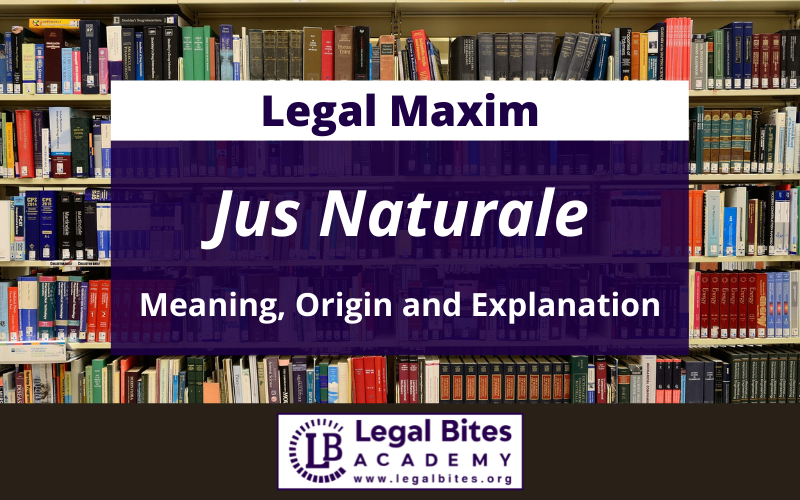Jus Naturale: Origin, Meaning and Explanation
This article titled ‘Jus Naturale: Origin, Meaning and Explanation’ is written by Sahajpreet Bhusari and discusses the legal maxim of Jus Naturale. I. Origin and Meaning Jus Naturale is a legal term of Latin origin. In Latin, the term literally means ‘Natural Law’.[1] II. Explanation The philosophical system of legal and moral principles known as Jus naturale is said… Read More »

This article titled ‘Jus Naturale: Origin, Meaning and Explanation’ is written by Sahajpreet Bhusari and discusses the legal maxim of Jus Naturale. I. Origin and Meaning Jus Naturale is a legal term of Latin origin. In Latin, the term literally means ‘Natural Law’.[1] II. Explanation The philosophical system of legal and moral principles known as Jus naturale is said to be founded on human nature and moralistic ideals of good and wrong rather than legislation, judicial...
This article titled ‘Jus Naturale: Origin, Meaning and Explanation’ is written by Sahajpreet Bhusari and discusses the legal maxim of Jus Naturale.
I. Origin and Meaning
Jus Naturale is a legal term of Latin origin. In Latin, the term literally means ‘Natural Law’.[1]
II. Explanation
The philosophical system of legal and moral principles known as Jus naturale is said to be founded on human nature and moralistic ideals of good and wrong rather than legislation, judicial action, or statutes.
Natural justice is made up of three rules:
The first is the “Hearing Rule”, which provides that anybody who is affected by a panel of expert members decisions should be given a fair chance to express his or her point of view and defend oneself.
Second, the “Prejudice rule” states that when making a decision, a panel of experts should be free of bias. The choice should be made in a free and fair manner, in accordance with natural justice principles.
Finally, “Reasoned Decision” refers to a court order, decision, or judgement issued by the Presiding Authorities on a valid and reasonable basis.
III. Application
The principle’s main goal is to ensure that everyone has an equal chance to be heard, Fairness as a concept, To close the legal gaps and loopholes, To safeguard fundamental rights, The Constitution’s fundamental elements, and prevention of miscarriage of justice.
The principles of natural justice should be free of bias, and parties should be given a fair opportunity to be heard. The court should also inform the parties of all the grounds for its decisions.
IV. Case Laws
To begin with, the procedure of fair trial technique, valid and proper notice should be made to the required parties of the matter. Even though the statute does not require the giving of notice, it will be done before any decisions are made. In the matter of Fazalbhai v. Custodian[2], this was decided.
The court stated in Kanda v. Government of Malaya[3] that notice must explicitly and clearly describe the topic of bias, facts, and circumstances against which action should be taken. It is one of the individual’s rights to defend himself, so he should be knowledgeable about the subject so that he can refute the assertion and protect himself.
The notification should pertain to the charges levelled against the accused individual and the upcoming proceedings. He can only be prosecuted for the charges listed in the notice, and not for any other offences.
References
[1] Jus Naturale, Available Here.
[2] 1961 AIR 1397.
[3] (1962) 28 MLJ 169.


